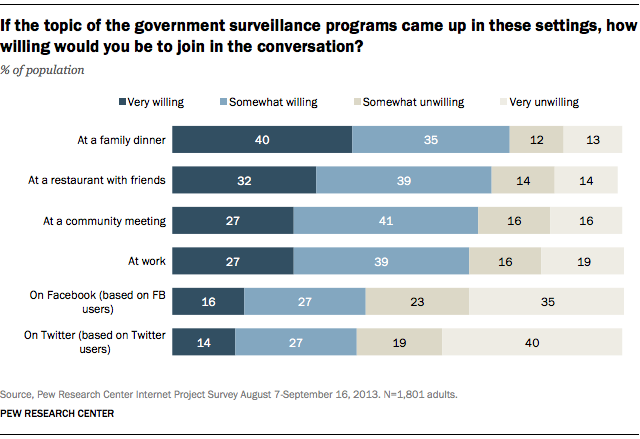Do online social media drive a "spiral of silence" which can stifle proper debate? It can, according to this techcrunch article, which points to this survey from Pew Research.
 |
| Shhh by Catherine on Flickr |
I think everyone would agree that for knowledge to be shared effectively in organisations, people need to feel free to enter online debates and feel free to disagree with the opinions of others. Knowledge often comes through comparing and challenging conflicting "truths" in order that new truths and new knowledge can be born.
However the nature of online social media is such that we often create our own silos, and when addressing potentially contentious topics, are unwilling to discuss ideas which the rest of the group does not share (a structure called "polarised crowds" by this article, which I also explore in this blog post on groupthink in social media). This has been referred to as "a spiral of silence" where people with dissenting views remain quiet.
The Pew Research survey explored the willingness to debate online by choosing a contentious topic (in this case the topic of government surveillance) and exploring how openly people would be willing to discuss this in various settings.
As shown below, social media are at the bottom of the list, and people are nearly 4 times less willing to share their thoughts openly online than they are round the dinner table.
As shown below, social media are at the bottom of the list, and people are nearly 4 times less willing to share their thoughts openly online than they are round the dinner table.
The study has the following conclusions
Overall, the findings indicate that in the (government surveillance) case, social media did not provide new forums for those who might otherwise remain silent to express their opinions and debate issues. Further, if people thought their friends and followers in social media disagreed with them, they were less likely to say they would state their views on the story online and in other contexts, such as gatherings of friends, neighbors, or co-workers. This suggests a spiral of silence might spill over from online contexts to in-person contexts, though our data cannot definitively demonstrate this causation. .
Does this spiral of silence apply in workplace social media?
I have seen this happen in the work setting, as in the example below.
A new community of practice for project managers was launched in an organisation. Over a couple of months, activity started to pick up nicely in the community forum, with many people asking questions and receiving answers. However when we followed up with the originators of the questions, we found an interesting pattern had developed. The first answer to the question set the tone, and from that point the only people contributing to the thread were those who agreed with the first answer. Anyone who disagreed found a private offline way to contact the questioner, such as a phone call or a personal email.
We were able over time to resolve this behaviour through strong facilitation, and the community now works well in publicly exploring multiple views on all topics.
For those of us seeking to foster knowledge sharing within an organisation, the research study quoted above is very important. If we do not address this tendency towards a spiral of silence, our in-house social media will either create a new set of silos - silos divided by opinions rather than by geography or by organisational hierarchy (the "polarised crowds" mentioned above) - or people with contrary opinions will just drop out of the conversation.
The lessons to the Knowledge Manager are clear
To start with, we cannot afford plural communities of practice covering the same topic. There needs to be one community covering each main work topic, not two or more polarised ones.
Then within each topic, disagreement needs to be sought and explored, in service of finding the truth. This is part of the role of the community facilitator - the role of allowing a diversity of opinion, and promoting and facilitating the dialogue that allows this diversity to be explored and resolved.
Finally, for the really contentious topics, you need a face to face discussion, such as a Knowledge Exchange.





2 comments:
It would be interesting to explore whether there is a difference in workplace social media (Yammer, etc.) vs something perceived as more "open", like Facebook & Twitter.
I would hope numbers for a closed work network would fall out more in line with other "work" settings, but if not then it would point to virtual organizations needing to provide alternative means of interaction (video meetings, retreats, etc.)
Research on this would be good, Steven. As I show in the anecdote reported in the blog post, there can be a "spiral of silence" in workplace social media which can be addressed by good facilitation, but whether this is a greater or lesser extent than on Facebook and Twitter is unknown.
Post a Comment